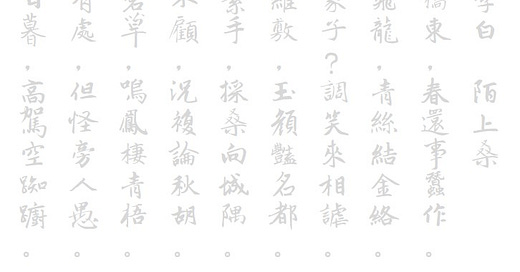Mulberry by the Lane Li Bai A beauty by the Bridge of Wei Was labouring one springtime day To make the silkworms grow. Just then, like dragons through the lane, With golden bits and purple reins Five horses in a row! With smiles and gifts, a steward came To ask her family and her name— My lord desires to know. Her name, good sir, was Qin Luofu, A face that all the city knew. And loved its lustrous glow. Beneath the city wall’s cool shade, Against the green of a mulberry glade, Her arms were white as snow. She didn’t give him time of day, But sent the envoy on his way, Where horses idled slow. Dismissed like feckless Lu Qiuhu, Departed when his wife was new, And five years later, passing through, Tried to seduce a farm girl who Turned out to be his bride, she knew That death was better than marriage to That cheap lothario. As falcons love pagoda trees, As emerald grasses sweetly please The crickets found below, Her heart was bound, it was not free, And only a fool could fail to see She’d no love to bestow. Till evening, noble horses champed, For nothing, by the wayside stamped, For Luofu would not go.
The story of Qin Luofu is an old morality tale that was given its classic formulation in a Han Dynasty poem. Tang poets were able to write somewhat indirectly about the story because it was well known to all of their readership.
The episode from Luofu’s life described here is her attempted seduction by a local bigwig. Riding by in his convoy of five horses (demonstrating his wealth), he spies the beautiful farmer’s wife, and sends his man to ask if she will take a ride with him. She righteously refuses, and his time is wasted.
Li Bai mentions another, similar legend in his retelling of the Luofu story. Lu Qiuhu is a tragic Martin Guerre tale: Lu marries a young bride, and then departs to work in the capital after just five days. When he returns, five years later, he is a changed man. He tries to seduce a pretty girl that he spies along the way, only to be indignantly refused. When he gets home, both see to their horror that the target of his seduction was none other than his own wife. He is filled with shame; she commits suicide by jumping into the river.
For another take on the story of Luofu, see Fallen Flowers by Yang Ning.
In Chinese, Luofu’s story is marked by a charming onomatpoeia, chichu, which marks the sound of the horses restively stamping their feet as they pause by the road for our kerb-crawling official to try to pick up the pretty girl. Many retellings include this particular word, and it gives the story a very distinctive flavour, even though the retellings themselves vary wildly in their perspective. In this translation, I tried to reproduce the sound with my final rhyme: champ and stamp.
Li Bai’s version is marked by a single rhyme all through the poem, placing an “oo” or an “oh” sound at the end of every line. It gives the poem a sing-song, folky feeling that I tried to recapture with a consistent “oh” rhyme at the end of every verse in my English version.
李白 陌上桑
美女渭桥东,春还事蚕作。
五马如飞龙,青丝结金络。
不知谁家子?调笑来相谑。
妾本秦罗敷,玉颜艳名都。
绿条映素手,采桑向城隅。
使君且不顾,况复论秋胡。
寒螀爱碧草,鸣凤栖青梧。
托心自有处,但怪旁人愚。
徒令白日暮,高驾空踟蹰。




I like the consistent 'oo' ending in the explanation of the Qiuhu story before bringing it back to 'ow' at the end in line with the rest of the poem. Gives it a clear sense of being an aside to the main action, almost a footnote.